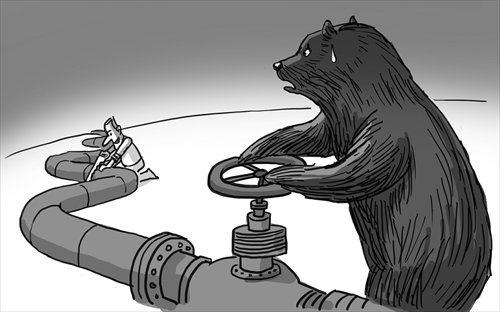HOME >> OP-ED
Russia caught between rock and hard place in Ukraine gas dispute
By Liu Qian Source:Global Times Published: 2014-4-14 23:08:02

Illustration: Liu Rui/GT
On April 1, Russia removed the favorable price it was charging Ukraine for natural gas. The delivery of natural gas to Ukraine will increase to a price of nearly $500 per 1,000 cubic meters from $268.5 in the first quarter of 2014.
However, although Russia had a reason to raise the price, Ukraine will not recognize the new price and will refuse to pay the debt it owes Russia's natural gas companies.
Meanwhile, as the relationship between Russia and Ukraine deteriorates, Ukraine's attitude is not as positive as it was when previously negotiating the natural gas price with Russia. Now Ukraine's gas debt to Russia's Gazprom amounts to $2.2 billion.
Ukrainian Energy and Coal Industry Minister Yuriy Prodan was quoted as saying, "In this situation there is a threat of cutting gas supplies to Ukraine and a corresponding threat to gas transport to Europe, because Ukraine's ability to maintain transport is not without limits."
Russian media believed that Prodan was indicating that Ukraine may siphon off Russian supplies intended for Europe if Russia halts its supply to Ukraine.
It is reported that Ukraine's state-owned gas company has no ability to pay for natural gas and the authorities may claim bankruptcy of this company, which means the huge debt is very likely to be left unsettled.
What's worse, no matter what Russia does in the next step, it will suffer huge losses.
If it cuts or stops supplies to Ukraine, this will not only unable to force Ukraine to pay back debts, but also affect Russian supplies to Europe. As a result, its reputation as a reliable natural gas supplier will be damaged.
If it continues to supply as much as Ukraine demands and let Ukraine siphon off supplies to Europe, Russia has to bear even greater losses.
If Russia cannot solve the dispute over prices with Ukraine within a short period of time, it will have to resort to reducing or stopping supplies to Ukraine, which will not just worsen its relations with Europe, but its natural gas exports will also decline sharply.
Interestingly, the one that is playing the natural gas card is not Moscow, but Kiev, as the latter is caught between the West and the East.
The Energy Ministry of Ukraine has announced the new price Russia has set is unacceptable and it will stop purchasing natural gas from Russia. This means Ukraine has taken the initiative in forcing the West to take assistance measures to improve its financial situation on the one hand and resisting Russia's price-rising request on the other hand.
For a long time, there has been a saying that Russia uses natural gas as leverage. This actually reflects the dilemma of Russia in the post-Soviet era, when its economic strength has declined and it lacks competition measures.
As a supplier of natural gas, Russia has taken a unilateral approach in the matter. In essence, it is trying to reinforce its status as a rule-maker in not just the supply of natural gas but also economic cooperation and diplomacy. In other words, it is trying to maintain its natural gas hegemony.
A small country like Ukraine is trying to seek economic conditions and political room favorable to itself by using its advantage as a transit country to challenge Russia-tailored trade rules. But the premise is that both should not resort to open hostilities which may lead to disastrous results.
On April 10, Russian President Vladimir Putin wrote to European leaders to call for a meeting among finance and energy ministers from parties of Russia, Europe and Ukraine on the issue of Ukrainian economy and natural gas transport.
It can be seen that Russia doesn't want to cut off supply to Ukraine and Europe. It will be interesting to see how Russia will react given Ukraine has refused to pay for the natural gas and may even siphon off natural gas supplies to Europe.
As a "hegemon," Russia may find a headache to determine its bottom line. But one thing is certain: Once it knows where the bottom line is, it will take swift actions.
The author is an assistant research fellow at the Academy of Chinese Energy Strategy with the China University of Petroleum, Beijing. opinion@globaltimes.com.cn
Posted in: Viewpoint